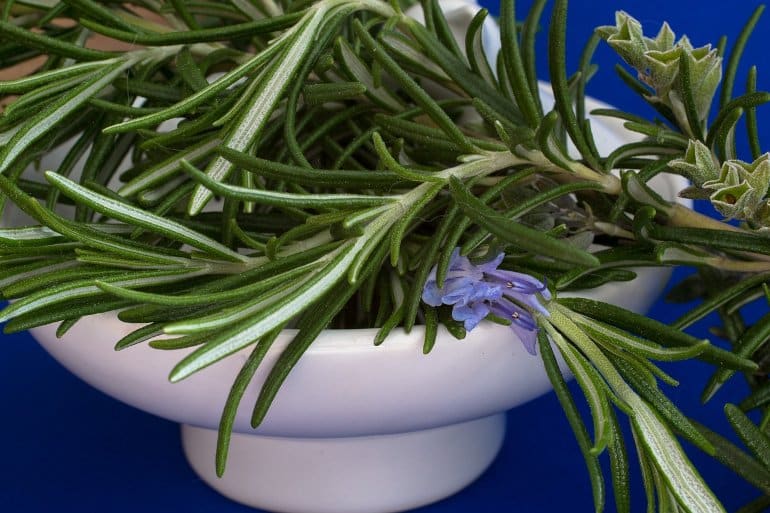Summary: Carnosic acid, a compound found in the herb rosemary, can block the interaction with the COVID-19 SARS_CoV_2 spike protein and ACE2, the protein receptor the virus uses to gain access into cells. The compound appears to have anti-inflammatory effects and has previously been associated with a reduction in Alzheimer’s symptoms.
Source: Scripps Research Institute
A team co-led by scientists at Scripps Research has found evidence that a compound contained in the medicinal and culinary herb rosemary could be a two-pronged weapon against the SARS-CoV-2 coronavirus that causes COVID-19.
The scientists, in experiments described in a paper published January 6, 2022 in the journal Antioxidants, found that the compound, carnosic acid, can block the interaction between the SARS-CoV-2 outer “spike” protein and the receptor protein, ACE2, which the virus uses to gain entry to cells.
The team also presented evidence, and reviewed evidence from prior studies, that carnosic acid has a separate effect in inhibiting a powerful inflammatory pathway—a pathway that is active in severe COVID-19 as well as in other diseases including Alzheimer’s.
“We think that carnosic acid, or some optimized derivative, is worth investigating as a potentially cheap, safe, and effective treatment for COVID-19 and some other inflammation-related disorders,” says study senior author Stuart Lipton, MD, Ph.D., Professor and Step Family Foundation Endowed Chair in the Department of Molecular Medicine and founding co-director of the Neurodegeneration New Medicines Center at Scripps Research.
In a 2016 study, Lipton and colleagues showed that carnosic acid activates an anti-inflammatory, antioxidant signaling cascade called the Nrf2 pathway, and found evidence that it reduces Alzheimer’s-like signs in mouse models of that disease, which is known to feature brain inflammation.
For the new study, Lipton, along with Chang-ki Oh, Ph.D., and Dorit Trudler, Ph.D., respectively a staff scientist and postdoctoral fellow in the Lipton lab, and first author Takumi Satoh, Ph.D., of the Tokyo University of Technology, described their further studies of this anti-inflammatory effect on the immune cells that drive inflammation in COVID-19 and Alzheimer’s.
The researchers also reviewed evidence from other investigators’ studies indicating that carnosic acid inhibits inflammation in other disease models. They proposed that this effect could be beneficial against the inflammation observed in COVID-19 and in some cases of the post-COVID syndrome known as long COVID, whose reported symptoms include cognitive difficulties often described as “brain fog.”
Additionally, the scientists described a COVID-19 infection-blocking experiment conducted by Oh. Using a standard infectivity assay, he showed that carnosic acid can directly block SARS-CoV-2’s ability to infect cells, with progressively greater infection-blocking activity at higher doses.

While the research is preliminary, the researchers propose that carnosic acid has this antiviral effect, despite being a safe and relatively unreactive compound, because it is converted to its active form by the inflammation and oxidation found at sites of infection. In that active form, they suggest, the compound modifies the ACE2 receptor for SARS-CoV-2—making the receptor impregnable to the virus and thereby blocking infection.
“Carnosic acid represents a ‘pathologically activated therapeutic’ in preclinical models of disease —inactive and innocuous in its normal state, but converted to an active form where it needs to be active,” Lipton says.
Lipton and his colleagues are now working with Scripps Research chemists, including Phil Baran and Ben Cravatt, professors in the Department of Chemistry, to synthesize and test more potent derivatives of carnosic acid with improved drug characteristics for potential use in inflammation-related disorders.
Lipton and Satoh hold patents for the use of carnosic acid derivatives for degenerative diseases.
About this COVID-19 and inflammation research news
Author: Press Office
Source: Scripps Research Institute
Contact: Press Office – Scripps Research Institute
Image: The image is in the public domain
Original Research: Open access.
“Potential Therapeutic Use of the Rosemary Diterpene Carnosic Acid for Alzheimer’s Disease, Parkinson’s Disease, and Long-COVID through NRF2 Activation to Counteract the NLRP3 Inflammasome” by Takumi Satoh et al. Antioxidants
Abstract
Potential Therapeutic Use of the Rosemary Diterpene Carnosic Acid for Alzheimer’s Disease, Parkinson’s Disease, and Long-COVID through NRF2 Activation to Counteract the NLRP3 Inflammasome
Rosemary (Rosmarinus officinalis [family Lamiaceae]), an herb of economic and gustatory repute, is employed in traditional medicines in many countries. Rosemary contains carnosic acid (CA) and carnosol (CS), abietane-type phenolic diterpenes, which account for most of its biological and pharmacological actions, although claims have also been made for contributions of another constituent, rosmarinic acid.
This review focuses on the potential applications of CA and CS for Alzheimer’s disease (AD), Parkinson’s disease (PD), and coronavirus disease 2019 (COVID-19), in part via inhibition of the NLRP3 inflammasome. CA exerts antioxidant, anti-inflammatory, and neuroprotective effects via phase 2 enzyme induction initiated by activation of the KEAP1/NRF2 transcriptional pathway, which in turn attenuates NLRP3 activation. In addition, we propose that CA-related compounds may serve as therapeutics against the brain-related after-effects of SARS-CoV-2 infection, termed “long-COVID.”
One factor that contributes to COVID-19 is cytokine storm emanating from macrophages as a result of unregulated inflammation in and around lung epithelial and endovascular cells. Additionally, neurological aftereffects such as anxiety and “brain fog” are becoming a major issue for both the pandemic and post-pandemic period.
Many reports hold that unregulated NLRP3 inflammasome activation may potentially contribute to the severity of COVID-19 and its aftermath. It is therefore possible that suppression of NLRP3 inflammasome activity may prove efficacious against both acute lung disease and chronic neurological after-effects.
Because CA has been shown to not only act systemically but also to penetrate the blood–brain barrier and reach the brain parenchyma to exert neuroprotective effects, we discuss the evidence that CA or rosemary extracts containing CA may represent an effective countermeasure against both acute and chronic pathological events initiated by SARS-CoV-2 infection as well as other chronic neurodegenerative diseases including AD and PD.






